This article was written exclusively for Investing.com
- Coffee futures reach multi-year high in July 2021
- Starbucks hits an all-time peak the same month - Earnings continue to exceed expectations
- The cost of goods sold increases for the company
- Inflationary pressures, weather, supply chain issues have been bullish for coffee
- Companies will pass along higher costs to consumers - SBUX remains in a bullish trend
Starbucks (NASDAQ:SBUX) is the most successful coffee chain worldwide. In 2020, the company had 32,646 stores. There were more Starbucks venues outside the United States than in the country in which it's headquartered. In the US, there were 15,328 Starbucks, with 17,318 spread in countries throughout the world.
Seattle, Washington-based Starbucks’ business is all about coffee. The company is the world’s leading coffee bean consumer.
Indeed, coffee and Starbucks are synonymous. The recent rise in coffee prices to a multi-year high at over $2 per pound is likely eating into SBUX’s profits. However, the price action in the shares shows that the company has not suffered from the rising price of its key product.
Coffee reached the highest price since 2014 in July 2021, when SBUX shares hit another record high. While it may be intuitive to believe that higher coffee prices will weigh on SBUX shares, the company will likely pass the costs to its massive customer base.
Coffee futures reach multi-year high in July 2021
Coffee prices exploded to the highest price in years in July on the back of rising inflationary pressures and weather and currency developments in Brazil, the world’s leading producer and exporter of Arabica coffee beans.
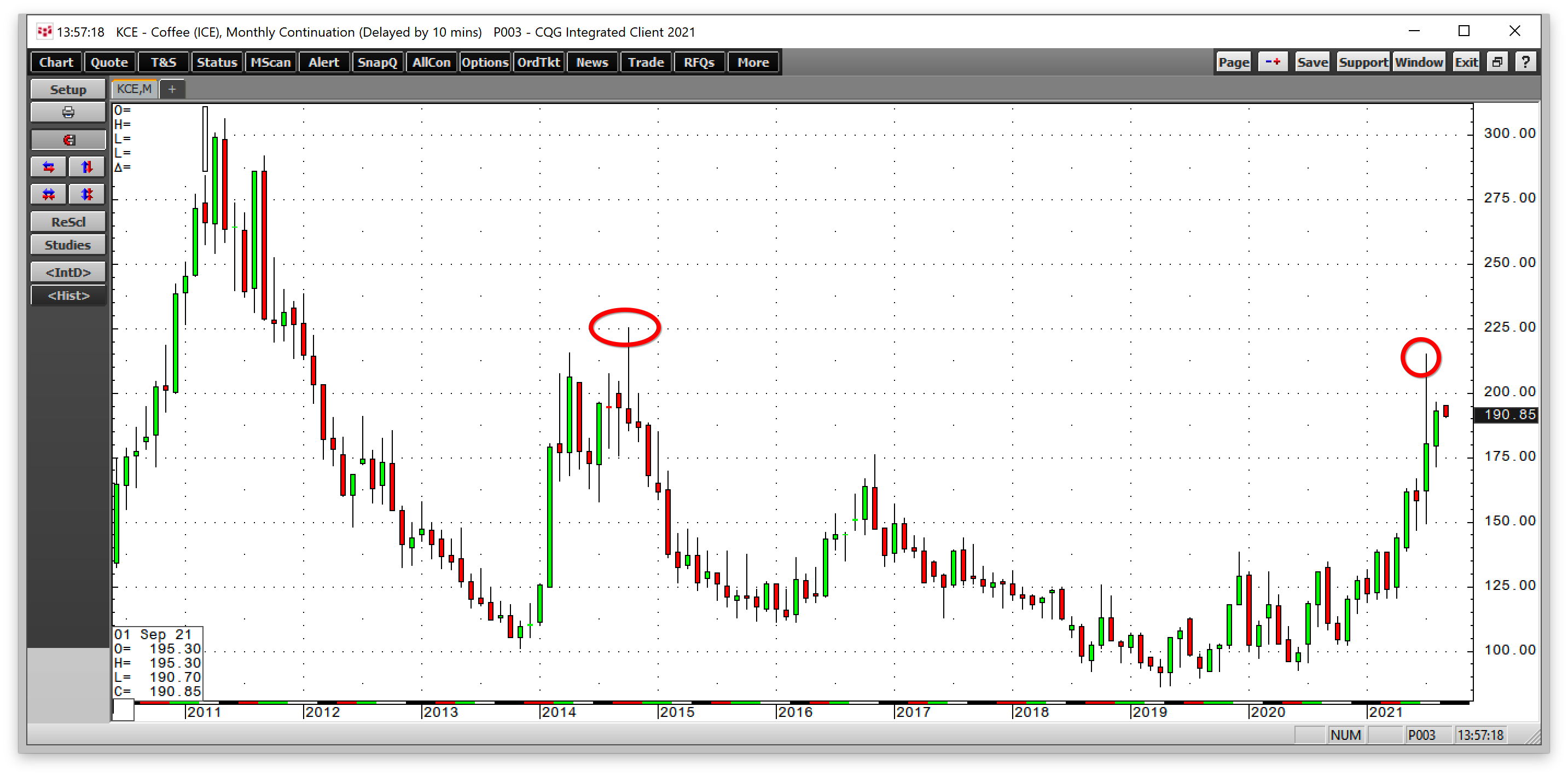
Source: CQG
The chart above highlights the ascent of ICE coffee futures that took the price to a high of $2.1520 per pound in July, the highest level since October 2014 when they peaked at $2.2525 per pound.
Coffee experienced quite a comeback as the price more than doubled from the June 2020, 92.70 cents low. In Brazil’s top coffee-growing areas, a frost pushed the price to over $2 per pound for the first time in nearly seven years. Meanwhile, the rise in the Brazilian real versus the US dollar increased local production costs, putting upside pressure on coffee futures since the mid-2020 low.
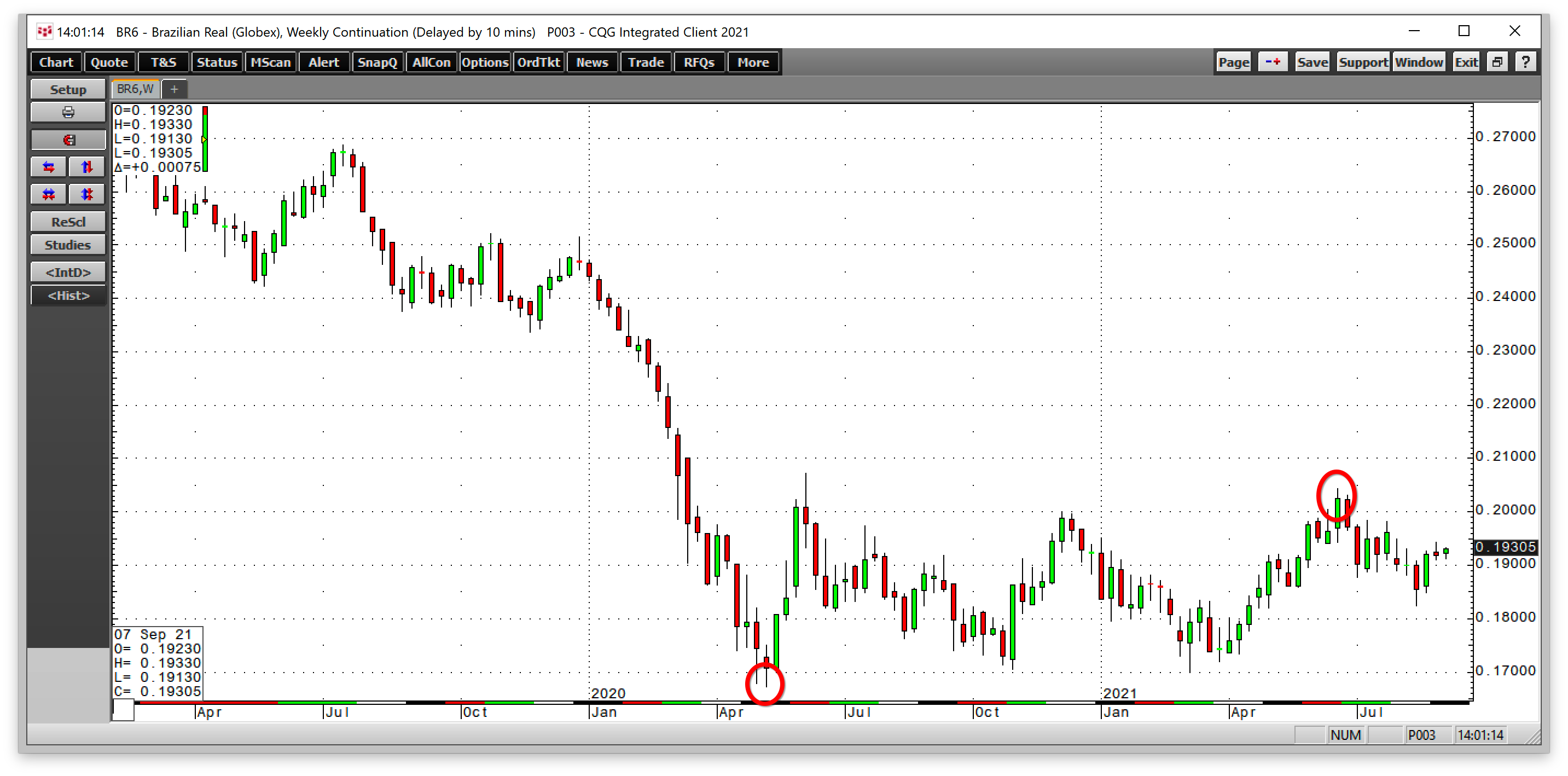
Source: CQG
The chart shows the rise in the value of the Brazilian real versus the US dollar from the May 2020, $0.1673 low to the July, $0.20445 high, an increase of 22.2%. Rising labor and other local costs have been bullish for coffee futures.
The nearby December coffee futures contract was trading at just over the $1.90 per pound level on Friday, Sept. 3.
SBUX hits all-time peak the same month; Earnings continue to exceed expectations
Because coffee beans are the primary product the company offers, Starbucks is a massive coffee consumer. Since the stock market reached a bottom in March 2020, SBUX shares have been trending steadily higher.
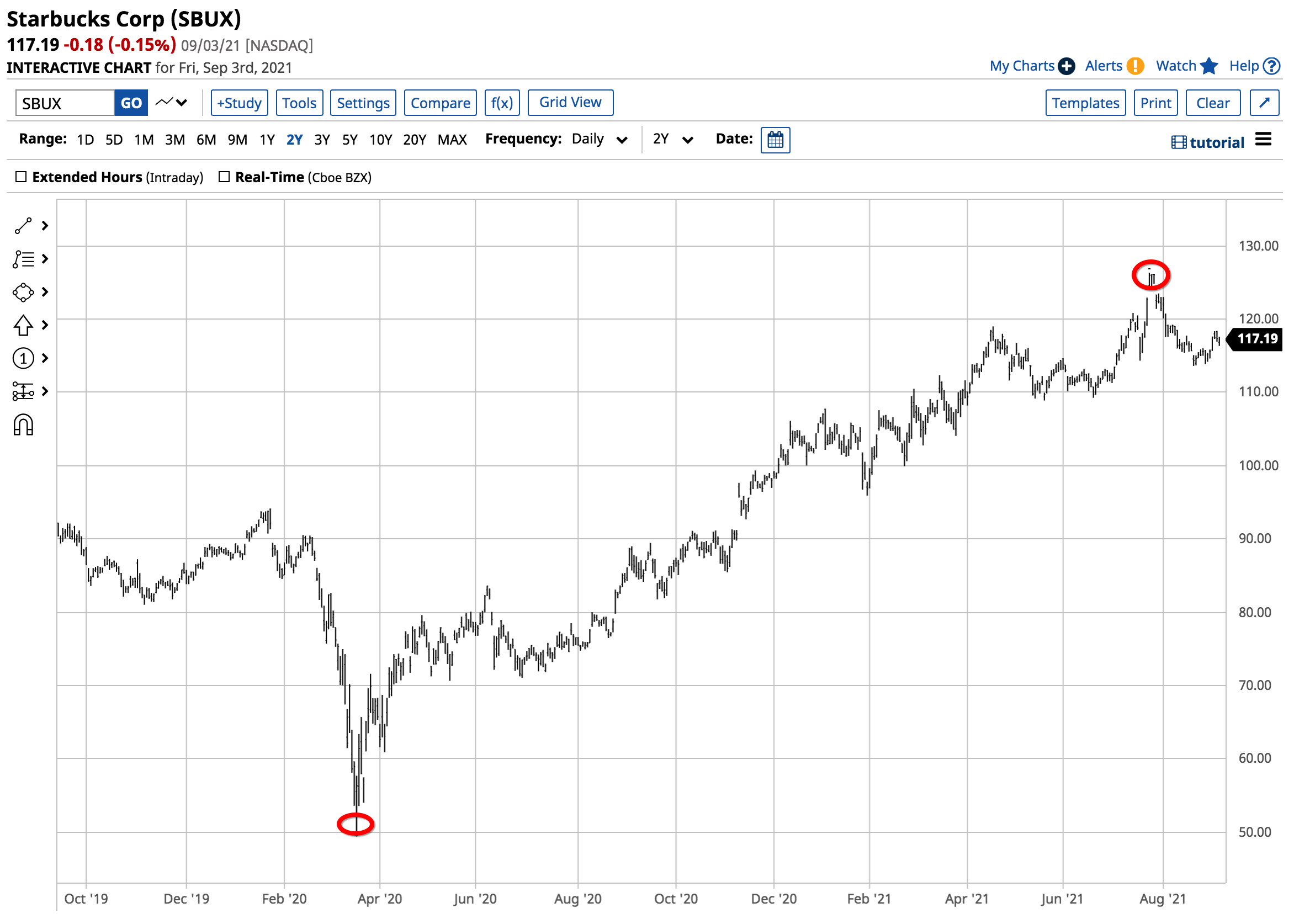
Source: Barchart
The chart shows the ascent of SBUX shares from a low of $50.02 on Mar. 18, 2020, to a record high of $126.32 on July 23, 2021, an over 152.5% gain in the stock.
SBUX continues to exceed analysts’ earnings forecasts each quarter.
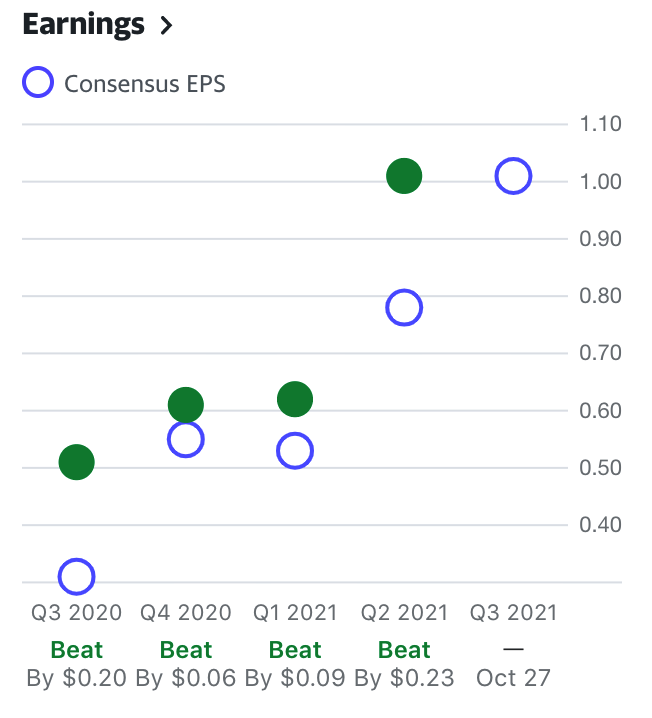
Source: Yahoo (NASDAQ:AABA) Finance
The chart highlights SBUX has exceeded consensus earnings projections over the past four consecutive quarters. In Q2 2021, the company earned $1.01 per share, 23 cents better than the market had expected.
SBUX was trading at the $117.19 level on Friday, Sept. 3. At time of publication it's moved higher, to $118.04. A survey of thirty-one analysts on Yahoo Finance has an average price target of $131.40 per share, which would put the stock at a new record high. Currency forecasts range from $95 to $148 per share.
The cost of goods sold increases for the company
Rising coffee prices are an expense for SBUX and other coffee consumers. Coffee beans are a significant cost-of-goods-sold issue for the company.
While the recent explosive move in coffee to over $2 per pound has not impacted earnings, a continuation of price appreciation in the soft commodity could weigh on the company’s share price.
The last substantial bull market in coffee futures began in 2008 during the global financial crisis and peaked in 2011. 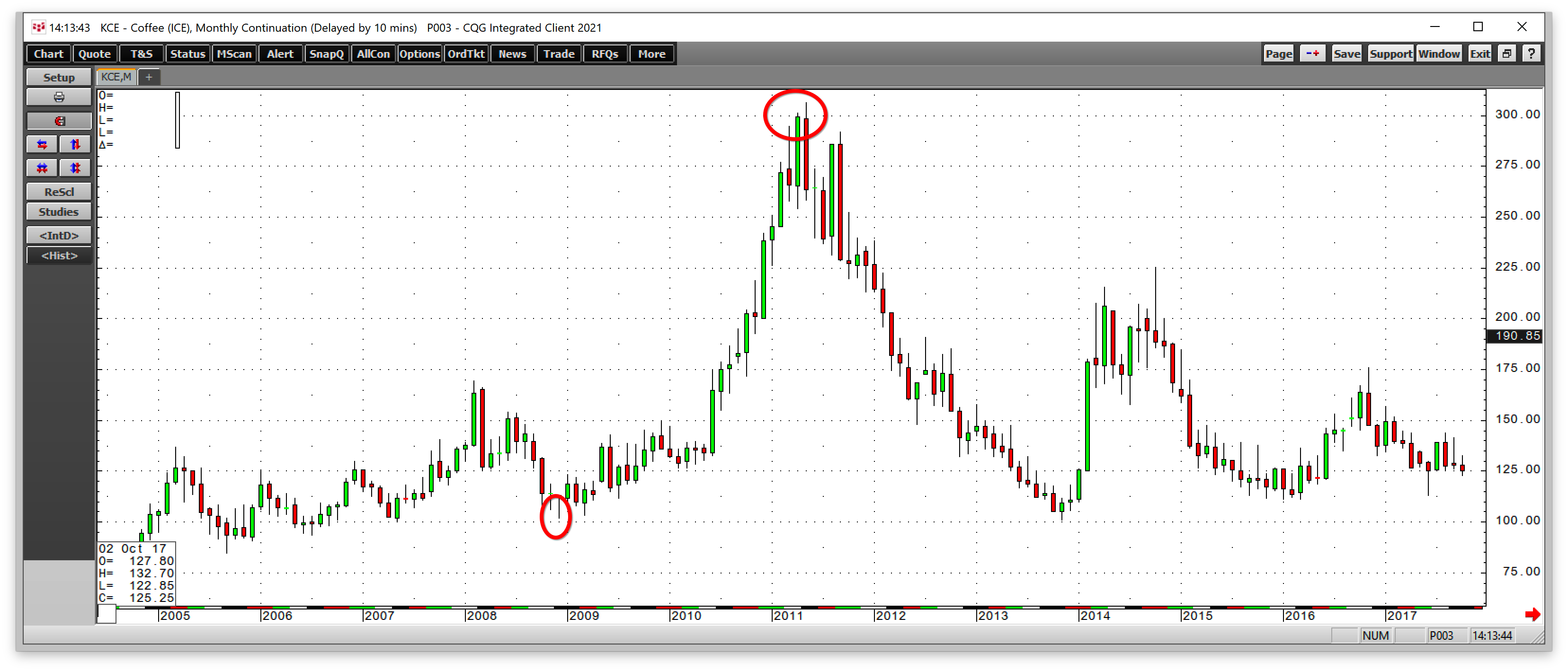
Source: CQG
As the monthly chart highlights, the inflation environment in the wake of the 2008 worldwide financial crisis lifted Arabica coffee futures from a low of $1.0170 per pound in December 2008 to a high of $3.0625 in May 2011. The commodity’s price has tripled in two and one-half years.
Inflationary pressures, weather, supply chain issues have been bullish for coffee
The only difference in the central bank’s and government’s approach to the global pandemic and the 2008 crisis was that in 2020, monetary and fiscal stimulus levels have been far higher. Albert Einstein once said the definition of insanity is doing the same thing repeatedly and expecting a different result. The monetary and fiscal policy initiatives since March 2020 have ignited an inflationary fuse.
Coffee futures tripled in value from 2008 through 2011. The recent move to $2.1520 per pound could be the beginning of a rally that will last for the coming years.
Meanwhile, the coffee futures market has experienced an almost perfect bullish storm. With other commodity prices rising, Brazil’s currency has been trending higher, increasing production costs. The recent frost is likely to put downward pressure on supplies. Moreover, as COVID-19 and its variants continue to rage in Brazil, supply chain issues have developed, making it more expensive and challenging to transport the beans.
Companies will pass along higher costs to consumers; SBUX remains in a bullish trend
The path of least resistance for coffee futures and SBUX shares remains bullish. Time will tell if rising coffee prices begin to weigh on Starbucks’ earnings and the company’s share price. However, inflationary pressures are eroding money’s value and lifting the prices of all assets.
Starbucks will pass along the increase in coffee prices to its loyal customer base. With costs rising for all consumer goods, SBUX is just another company that will raise prices. The cup of Starbucks coffee is not all that elastic as the company offers its customers the product along with an environment, which should soften the blow of rising coffee prices.
Inflation is seeping through to all goods, services, and asset prices. SBUX shares are likely to follow the overall stock market, which remains in a bullish trend, rather than the wholesale coffee price. The primary danger to SBUX is a correction in the stock market since it will pass higher coffee prices along to its loyal customers.
